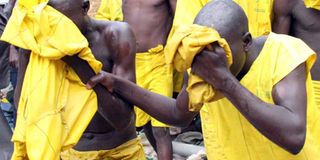No to a mandatory death sentence

Jailed. Inmates at Lira Central Prison. President Museveni wants a mandatory death penalty for suspects in cases of murder. FILE PHOTO
What you need to know:
- Sentence. We are living precariously on the political and human rights front as it is; the last thing is to introduce a mandatory death sentence in grey areas of shaky evidence, politically-motivated arrests and insufficient investigative capabilities, writes Timothy Kalyegira.
President Museveni this week stated his wish for the introduction of a mandatory death penalty for suspects in cases of murder.
This came in the wake of the murder of his nephew Joshua Rushegera and a companion in the same car, Melina Tumukunde, on the Kampala-Entebbe Expressway.
In a letter, the President wrote: “We need to make this clear to the courts. It must be an eye for eye. Nothing less will be acceptable to the freedom fighters that I represent and the entirety of the electorate of Uganda that I represent.”
This is a dangerous development.
First, it is an act of presidential overreach. The Executive is the most powerful of the three branches of government, but it is just one of three branches.
Today’s meek and submissive Judiciary might not always act the part, but on paper at least it is the second branch of government, independent of the Executive and of the third branch, Parliament.
Uganda’s legal community must stand up to this development.
In a country such as the United States with its solid separation of powers and strong criminal justice system, we have seen many instances of suspects jailed for years or decades, only for new evidence or new forensic technology to show that the original homicide conviction was made in error.
How much more for a country like Uganda with weak investigative capabilities at best and where there is always the risk of politically-motivated charges? The President has been steadily calling for tougher measures against violent crime over the years, starting over a decade ago when he wondered why suspects are granted bail in murder cases.
The rearrest of the Opposition leader Col Kizza Besigye in 2005 after the High Court had granted him bail and last week’s rearrest of suspects in the murder of the senior police officer Andrew Kaweesi reflect this pattern of thinking.
Clearly, Museveni has a different view of the principles of the law than is conventional.
If suspects who have been legally granted bail can be rearrested in broad daylight along with their lawyer, what kind of State is this?
I can only hope that the fourth branch of the Uganda government steps in and puts pressure on the President to abandon this idea of a mandatory death sentence.
That fourth branch is the European donor countries on whom Uganda depends for so much.
We are living precariously on the political and human rights front as it is; the last thing is to introduce a mandatory death sentence in grey areas of shaky evidence, politically-motivated arrests and insufficient investigative capabilities. Better for many convicts to rot away in Luzira Upper Prison than for even one innocent person to be put to death.
Finally, given that he tends to be historically minded, I hope Mr Museveni knows some of history’s ironies.
In the 1960s, the Cabinet minister Grace Ibingira advanced a new law of detention without trial and not long after became one of the first victims of the draconian law when he and a few other ministers were arrested in 1966.
The-then minister of State for Internal Affairs Kizza Besigye was instrumental in the jailing of the former minister of State for Security Chris Rwakasisi and, as Besigye joked on 93.3 KFM in 2015, he was later to meet with Rwakasisi in Luzira prison in 2005.
The powerful prime minister Amama Mbabazi tabled the Public Order Management Bill before Parliament, a law that would curtail public political gatherings.
It was not long before Mbabazi fell out with Museveni, sought to run for the presidency and, of course, the same law that he had proposed was nicely used to block several of his campaign trips to various districts.
We have seen former heads of state, who once seemed invincible, first get overthrown by their own military and then be brought before court (Hosni Mubarak of Egypt, Omar al-Bashir of Sudan) in cages.
Might Museveni, unknowingly, be setting a trap for himself?
Might he, unable to see the ironic turn of history, be calling for the method by which he could end up?




